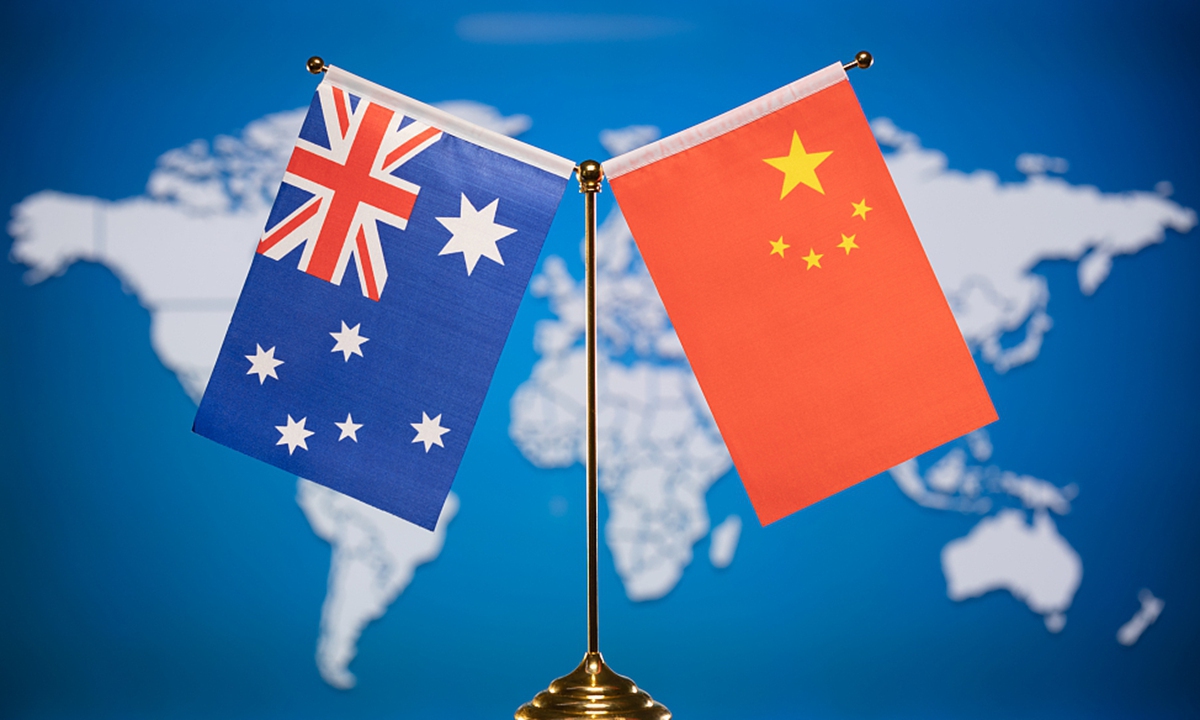
China Australia Photo: VCG
Chinese Commerce Minister Wang Wentao on Monday held
a video meeting with Australian Trade Minister Don Farrell, the first meeting between a Chinese commerce minister and an Australian trade minister in three years. Both sides described the meeting as an "important step" in bringing China-Australia economic and trade relations back onto the right track and agreed to maintain communication. At the meeting, Wang invited Farrell to visit China at "an appropriate time" and Farrell confirmed he will visit China "in the near future."
The highly anticipated meeting and the upcoming visit by the Australian trade minister to China have boosted expectations for improving economic and trade ties between the two countries after years of tension. However, many foreign media reports and the Australian side's statement on the meeting notably focus primarily on Canberra's call for resumption of "unimpeded trade." Legitimate concerns raised by China about Australia's treatment of Chinese companies were largely left out.
During the virtual meeting, Wang told Farrell that China pays close attention to Australia's tightening of security reviews on Chinese companies investing and operating in Australia and hopes that Australia will properly handle relevant cases and provide Chinese companies with a fair, open and non-discriminatory business environment. Wang also pointed out that China-Australia economic and trade ties face an important window and the two sides should work together to inject more positive factors into economic and trade cooperation.
Yet, Australia's official response to the meeting did not mention these remarks by the Chinese commerce minister. It did, however, mention the "unimpeded" and "full" resumption of trade twice, as if the Chinese side is solely responsible for restoring bilateral trade ties to normal. It is quite normal for officials to put out statements that are worded in their favor. It is also true that one meeting cannot realistically address all the issues between the two countries. Yet, for the sake of improving bilateral ties, it is necessary to remind the Australian side that to normalize bilateral economic and trade relations, the two sides must meet halfway and address each other's legitimate concerns.
Despite recent signs of improvement, Canberra cannot turn a blind eye to a slew of hostile moves it has taken against Chinese companies and investments over the years. Canberra has banned Chinese telecommunications firms Huawei and ZTE from providing 5G technology for its wireless networks. It has also unilaterally revoked two cooperation documents between China and the Australian state of Victoria over the Belt and Road Initiative and launched a review into a Chinese firm's lease for the port of Darwin, among other moves. Australia's notorious Foreign Investment Review Board (FIRB) has also implemented new strict rules on foreign investment and blocked a number of major Chinese investment deals, according to the Australian media.
Most recently, in November 2022, even as Canberra was actively seeking to improve ties with China, Australia vowed to be "more assertive" in scrutinizing foreign investments in key materials for electric cars and clean energy, Bloomberg reported, noting that it was "a potential warning to China." Bloomberg further linked Australia's pledge to the US' push to limit China's access to key supply chains and Canada's earlier move to order three Chinese firms to divest their interests in a trio of lithium miners. Whether Australia will follow through with that pledge remains to be seen, as a venture headed by Chinese firm Tianqi Lithium in January made a bid to buy Australian lithium developer Essential Metals, which requires approval from the FIRB, Reuters said.
As bilateral relations are showing improving signs, many Chinese businesses are also undoubtedly exploring opportunities in Australia. Given the highly complementary nature of the two economies, the opportunities are abundant. The question is whether Canberra is ready to treat Chinese companies and investments fairly. Australian officials' eagerness to improve economic and trade ties with China has been clear and has received a positive response from China. But to resume "full" and "unimpeded" trade, as Australian officials have called for, Canberra must first take concrete actions to address China's legitimate concerns and provide Chinese companies with a fair, non-discriminatory business environment. In this regard, Canberra shouldn't think that it can get away with just paying lip service.
The author is a reporter with the Global Times. bizopinion@globaltimes.com.cn




